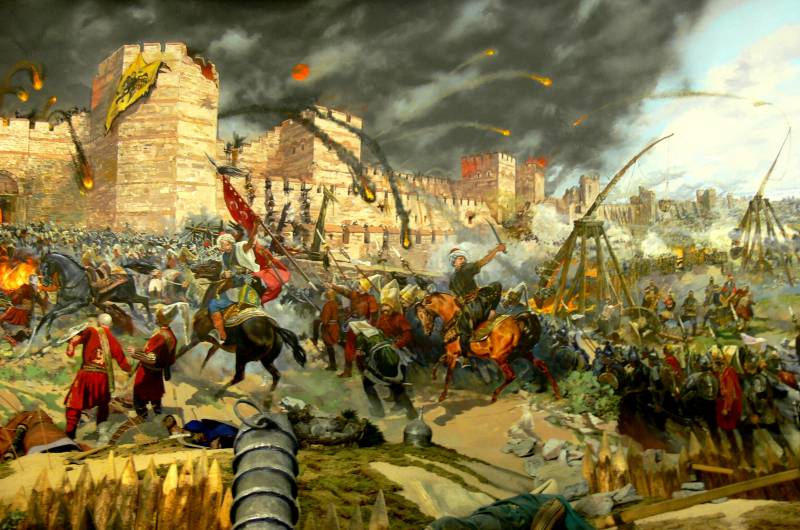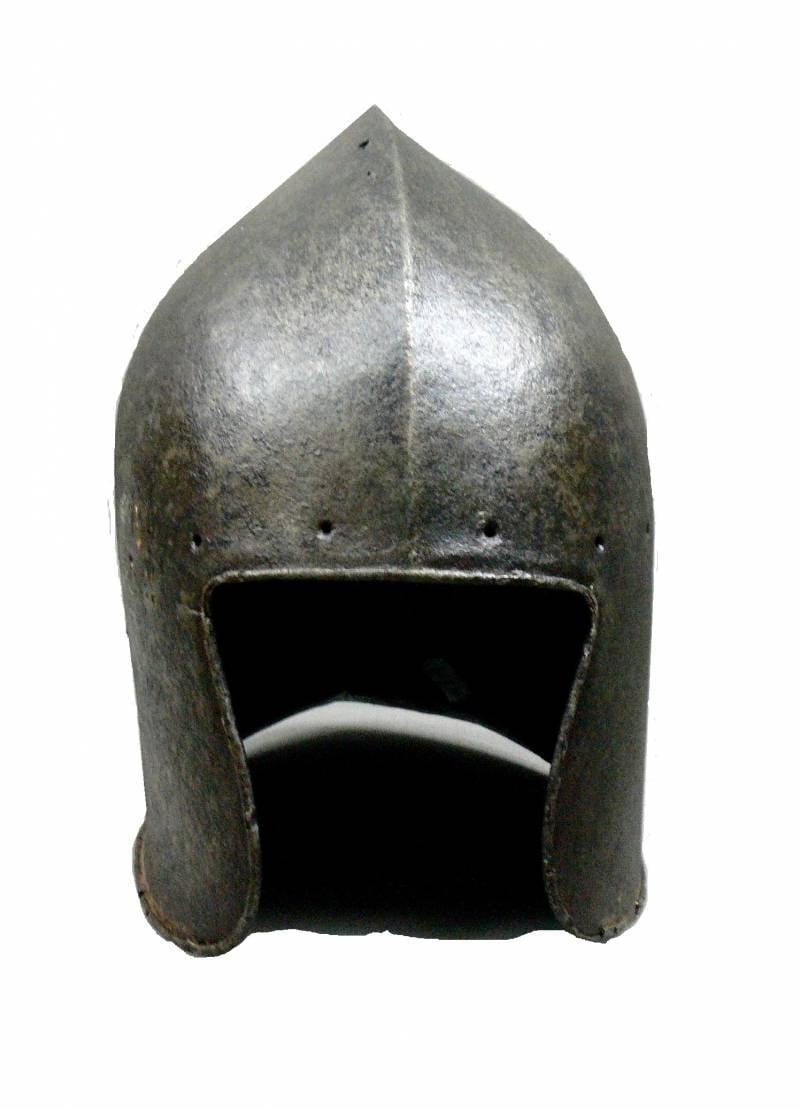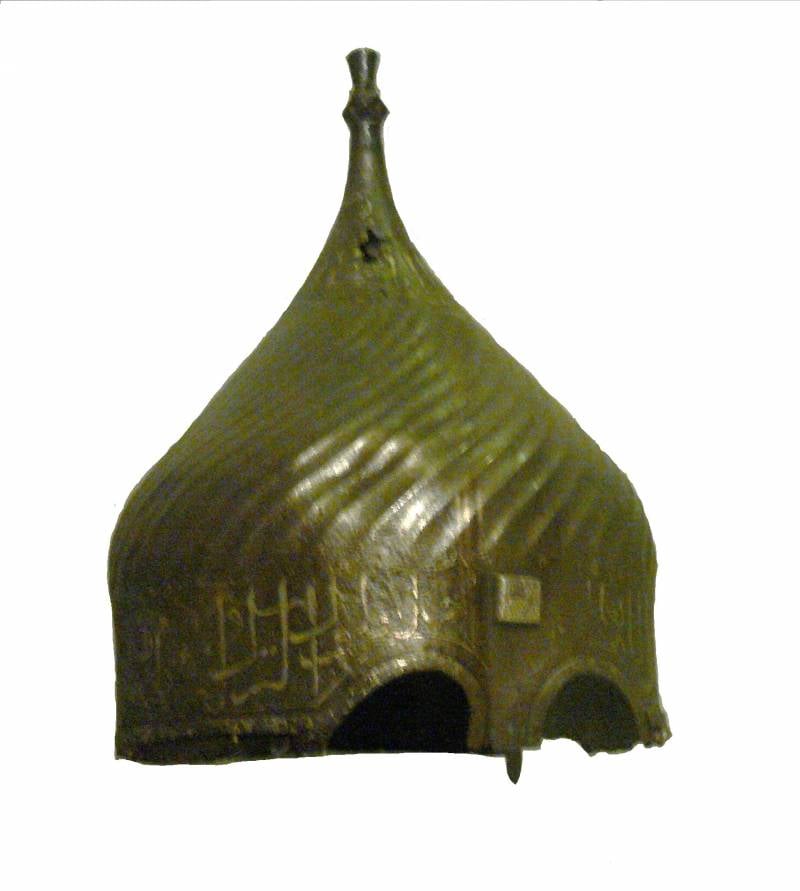The death of the Byzantine civilization
Entry
The reasons for the fall of the city of Constantinople, the early medieval center of the world, are described in great detail. There were enough articles on this subject on the VO website, and in this note I want to draw attention to a number of key factors that led to the fall of the Roman civilization.
So, Byzantium was the direct successor of the Roman Empire; the Byzantines themselves considered their history and the state is a direct continuation of the Roman Empire, without any continuity. It just happened that the capital and all state institutions were transferred from the West to the East.
In 476, the last emperor of the Western part of the empire was deposed in Rome, let us emphasize that the Roman state was not destroyed, but the Roman ruler was deprived of power, the signs of power were sent to Constantinople, the center of the empire was finally relocated to New Rome.
Western civilization took shape in the territories of the Roman Empire, not by succession, but by conquest, beginning from the end of the 5th — 6th centuries. The key question of the rivalry of Western countries with Byzantium, starting from the VIII century, was the struggle for the right to be considered the heir of the great Rome? Who to count? Western civilization of the Germanic peoples on a geographical basis or Roma civilization, based on the incident of state, political and legal succession?
In the 6th century, under Justinian the Great, the territory of the Roman Empire was practically restored. Returned Italy, Africa, part of Spain. The state covered the territory of the Balkans, Crimea, Armenia, Asia Minor (modern Turkey), the Middle East and Egypt.
A hundred years later, with the advent and expansion of Islamic civilization, the territory of the state was significantly reduced, the Arab invasion decided the fate of the imperial lands in the east: the most important provinces were lost: Egypt, the Middle East, Africa. At the same time, a part of the territories was lost in Italy. Ethnically, the country becomes almost the state of one people - the Greeks, the Greek language completely supplanted the universal imperial language - Latin.
From this period, the struggle for survival begins, sometimes illuminated by brilliant victories, however, the empire had no more economic or military forces to conduct constant and active military actions or create "challenges" to other civilizations.
This weakness, for some time, Byzantine diplomacy “compensated” with “tricks”, money, bluff.
But the ongoing struggle on several fronts exhausted the country. Hence the payment of "tribute", for example, Russia, under the guise of voluntary gifts, in order to compensate or level the damage.
An outbreak of political and military activity was observed in the X century, 40-ies of the XI century. In place of which came the new invasion from the steppe: Polovtsy, Pechenegs and Turks (Seljuk Turks).
The war with them and the beginning of a new invasion from the west (the Normans of southern Italy) brought the country to the brink of destruction: lands were lost in Italy (South and Sicily, Venice), almost all of Asia Minor was lost, the Balkans were destroyed.
In such conditions, the new emperor Alexey Komnin, a warrior and diplomat, turned to the West, to the Roman bishop, who was formally in Byzantine jurisdiction, although the schism in Christianity had already begun.
It was the first crusades that reanimated Byzantium, returned the lands in Asia Minor up to Syria. It would seem that a new renaissance began, which lasted until the 40-s of the XII century.
Due to the specifics of the Byzantine institutions of power, which were increasingly dilapidated, under the influence of the “tradition”: real and contrived, a period of discord in the country began again.
At the same time, there was an increase in Western countries, united by feudal institutions, which saw in Byzantium and Constantinople a source of fabulous wealth, at the same time, its administrative and military weakness.
What led to 4-th crusade and the capture of Constantinople by the Western soldiers. Fifty-seven years later, the Greeks of the Nicene "empire" with the support of the Genoese, Venice's competitors, regained the capital and a small part of the land in Europe, but during 50 years they lost all remnants of land in Asia Minor.
No lessons from the shame of defeat were made, and from that moment the state began to roll down the slope:
• all the same hope for a miracle and God's hand (“hope for God, but do not commit it yourself” is not the Byzantine motto);
• all the same quarrels and intrigues of the ruling elite for shares in a decreasing pie.
• inability and unwillingness to see reality, and not the world through glasses of imperial arrogance.
In the internecine struggle for resources, the ruling stratum lost lands, which fell under the power of foreigners, and with the loss of lands and a free congregator, the basis of the army and navy.
Of course, in the fourteenth and fifteenth centuries. there was an army and a small fleet in the country, but the latter could not solve any problems, giving way sharply flotillas, and not the fleets of the Italians, but in the end the Turks.
The army consisted of detachments of rebellious aristocrats and mercenaries who periodically staged uprisings in order to seize weak power in Constantinople.
The Romanian power after 1204 was only an empire by name, in fact it became a semi-colony of Italians, shrinking to the size of the city of Constantinople, small territories in Asia Minor (Trabzon) and Greece.
In this regard, I would like to quote a lengthy quotation from L.N. Gumilev, who brilliantly describes the situation of the ethnos at death. Within the framework of his theory, which many consider controversial, he noted an important phase in the development of an ethnos - obscuration (darkening):
Adaptation in case of such rapid and constant changes in the environment is inevitably delayed, and the ethnic group perishes as system integrity. ”
The ruling clans of Byzantium, fighting for power, began to actively use the "new mercenaries" - the Ottoman Turks, "introducing" them with the European part of the country. After that, the Ottomans conquered all the Balkan countries and Byzantine territories around the capital, which became the basis of their state, the center of which was the Roman city of Adrianople (modern Edirne). The militant Orthodox Serbs participated in all the campaigns as part of the Ottoman army, both during the battle with Timur and during the siege of Constantinople.
The fall of Constantinople at the end of the fourteenth century. It was postponed by another “miracle”: the Mongol conqueror Timur defeated the Turkish Sultan Bayazet.
In 1422, the Turks lifted the siege of Constantinople under the threat of invasion by Western troops.
All the diplomatic attempts of the last emperors, including the game of contradictions in the Ottoman camp, the union with the Catholics and the recognition of the Pope as the head of the Orthodox Church, were not crowned with success.
In 1444, the Turks at Varna crushed the army of the Crusaders, which could only indirectly help the Byzantines.
In 1453, despite the threat of another crusade, the young Sultan Mehmed II took the "capital of the world."
Now in the information space, there are two views on the problem of the death of the Byzantine civilization:
1. Themselves to blame - because of its "Byzantine policy", insidious and perfidious. We would agree with the West and the Pope, observe the agreements, and everything would be fine.
2. The blame is that they did not defend the Orthodox empire without creating a “strong state”. The idea is, of course, original, but not explaining anything.
The truth is still somewhere in the middle.
Byzantinist and church historian A.P. Lebedev wrote:
Or add a very correct opinion of L. N. Gumilev:
First of all, this characteristic of Romaic society should be attributed to its top, which, combining unbridled self-interest and unwillingness to make changes to decrepit governance institutions, was fascinated by Western trends, not realizing the essence of the phenomenon (“knighthood”, tournaments, “knightly” feasts, equestrian polo and etc.)
Excessive conservation of society has come into conflict with military technology. What did not allow at a certain stage to carry out "modernization" and led to the death of the country.
When we say “military technology”, we mean not only cannons or missiles as such, but the whole system of building defense: from training a soldier, his quality and health, to tactics and strategies in wars. If at certain stages of development of the country with theoretical “military science” in Byzantium everything was in order, the actual weapons were at a high level (which is one “Greek fire”), then the system of equipment for the armed forces and senior officers was always a problem. While there was money, it was possible to have mercenaries, but when the money ran out, the warriors ran out. And at the end of the twelfth century. Constantinople also lost technological advantages on land and sea, theoretical military science fell behind and retarded the development of tactics. With the loss of territories and finances, this problem has dramatically worsened.
The ideological disputes that periodically shook Byzantium did not contribute to the consolidation of society, it was a kind of “dispute during the plague.”
Attempts to modernize the system, or at least its elements, ran into aggressive conservatism. So, in the tenth century, when warrior-emperor Nikifor II Fok, who understood the need for ideological stimuli and personally saw how Arab warriors behave in battle, suggested
In the end, there remained one dead-end paradigm: "a turban is better than a papal tiara."
Let us paraphrase VI Lenin: any civilization, like any revolution, only then is it worth something, if it can defend itself, to provide a defense system. We read - the system of protection, we understand - the system of development.
The Roman Empire, or the Christian Byzantine civilization, fell under the pressure of Western civilization and was absorbed by Islamic civilizations due to the following reasons: the preservation of the control system and, as a result, its disappearance (where shall we go?). Civilization has ceased to form "calls", and the "answers" were becoming weaker. At the same time, all the energy of the Byzantine aristocracy, however, as well as of the metropolitan society, was aimed at personal enrichment and building a system of government only for these purposes.
In this connection, the fate of the Great Duc (Prime Minister) Luka Notara, a supporter of the "turban" who was captured by the Turks, is a landmark. His young son liked Sultan Mehmed II, who demanded him to his harem. When the father refused to give up his son for desecration, the sultan ordered the execution of the whole family. Laonique Halkkokondil wrote that the children before the execution asked their father to give in return for life all the wealth that was in Italy! Pseudo-Sfrandzi describes the situation differently, telling that after the capture of Constantinople, the Great Duca Luka brought untold riches to Mehmed, the sultan, indignant at his cunning, asked: “Why didn’t you want to help your emperor and your homeland and give them untold riches that you had ...? "
The situation is the best characterizing the self-interest of the highest representatives of the Byzantine government, who, having wealth, were not ready to use them to defend the country.
However, in the situation of 1453, the ruling class could not do anything, the mobilization system failed in 1204, and it was almost impossible to recreate it. And the last thing: the inertia and passivity of the masses, especially in the capital, unwillingness to make efforts in the struggle against enemies and the hope of a miracle, all these factors led the Roman empire to death. As the soldier Procopius of Caesarean wrote back in the VI. about Constantinople: “They wanted to be witnesses of new adventures [of war], albeit with dangers for others.”
The main lesson of the fall of the Byzantine civilization is, oddly enough, that ... civilizations are mortal.



Information